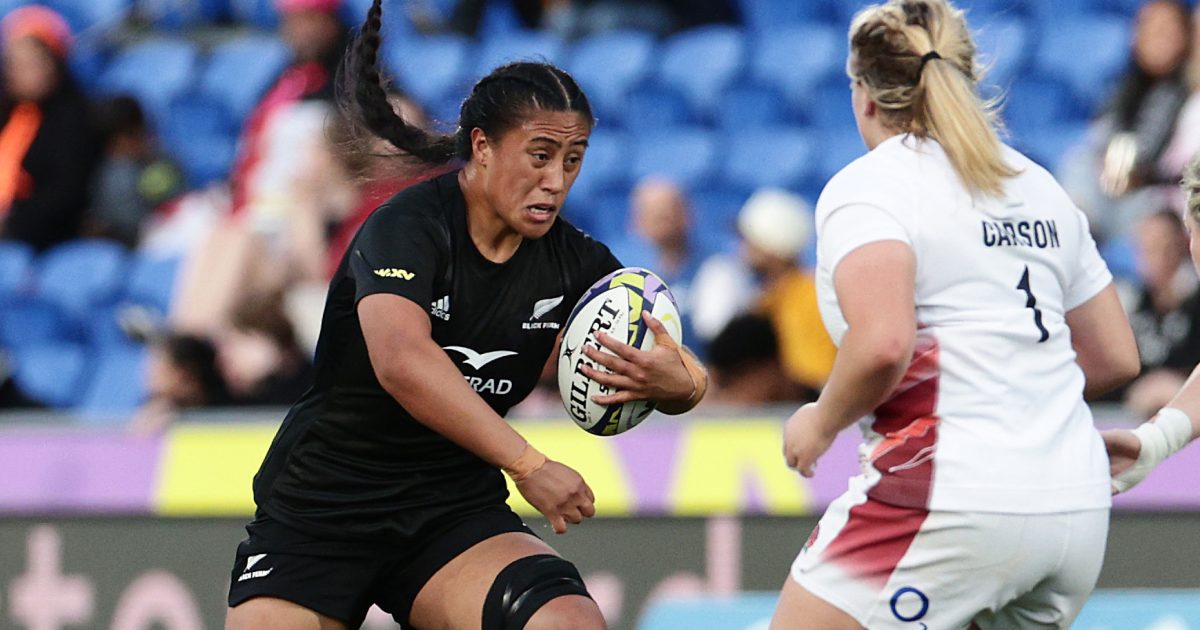‘A lot of us still feel the hurt’: The pain driving ‘underdog’ Black Ferns

Teams representing New Zealand are not used to starting rugby matches as underdogs, wherever they are staged or whatever the context.
Yet, having lost to France, England and Canada over the last 12 months to relinquish their World Rugby Pacific Four Series title and finish third at the inaugural WXV 1 on home soil, the Black Ferns know that is the role that awaits them at Allianz Stadium on Saturday.
Their hosts, the Red Roses, have put together a 16-Test winning run since New Zealand beat them in the Women’s Rugby World Cup 2021 final at Eden Park two years ago.
That is the sole defeat in England’s last 47 matches, a run that includes a comprehensive five-try 33-12 victory against the Black Ferns in Auckland in November last year.
“Where we are, you judge yourself off our last encounter with England and they beat us and they beat us comfortably as well,” Black Ferns assistant coach Steve Jackson admitted.
“Ever since then we knew that this game potentially could happen and now it’s here and we’ve pulled quite heavily towards this game.
“So, we probably are a little bit of an underdog going into this game and playing them at their home stadium. But again, you know, we need to front [up].
“They beat us last time, they out-passioned us and they wanted it a little bit more than what we did. So, we need to bring the same, if not more, this weekend.”
Jackson’s concession should not be mistaken for resignation, however. The Black Ferns, who have been training with speakers blaring in an attempt to replicate the atmosphere that Twickenham will generate with more than 40,000 fans inside, do not lack belief.
“We’ve been preparing for this game I’d say since the start of the year,” number eight Liana Mikaele-Tu’u revealed.
“We know it’s a big one and it’s definitely going to be one that tests us because we haven’t had that many games this year and I think a lot of us still feel the hurt from the game last year facing them.
“So, I think that’s definitely been fuel every time we’ve gone out to train.”
“This is the one that we’ve always had a target on,” fly-half Hannah King agreed. “I think it’s just the rivalry that everyone gets up for, everyone’s excited.
“What an occasion. It’s gonna be very special.”
One reason for Kiwi optimism comes in the form of Ayesha Leti-I’iga, the prolific winger who could make her first Test appearance since the World Cup final this Saturday.
Leti-I’iga’s last meaningful act on an international rugby pitch was scoring the match-winning try to beat England and secure a sixth world title for the Black Ferns.
It remains to be seen whether she can rediscover the form that helped her score 13 tries in only 21 Tests prior to a serious knee injury in July 2023. But her performances in training have got coaches and team-mates excited.
“[Leti-I’iga] is a different winger,” Mikaele-Tu’u said. “She’s not your typical winger that’s just fast. She’s explosive, very physical.
“She runs like a number eight but twice the speed. She’s a bulldozer, so you can literally put her anywhere on the field and shoot.”
New Zealand know they must hit the target with whatever chances come their way in Twickenham this Saturday if they are to end England’s latest run and lay down a marker for both WXV 1 and next year’s World Cup.
“We think we’ll probably get one or two or three opportunities and we’ve got to make sure that we take those,” Jackson said.
“They’re defensively strong and John Mitchell being there as well, he’s a defence coach and he’s been around a wee while. They’ll have to bring line speed and it’s how we adjust our attack to that.
“We’ve seen some growth within their attack as well, moving the ball inside their 22 as opposed to kicking more than what they’ve done before. But there are areas that, you know, we’ve been working towards to try and find some openings where we can breach and get in behind their defensive line.
“But it’s going to be tough. We know that we’re going have to work hard for 80 minutes.”







































































